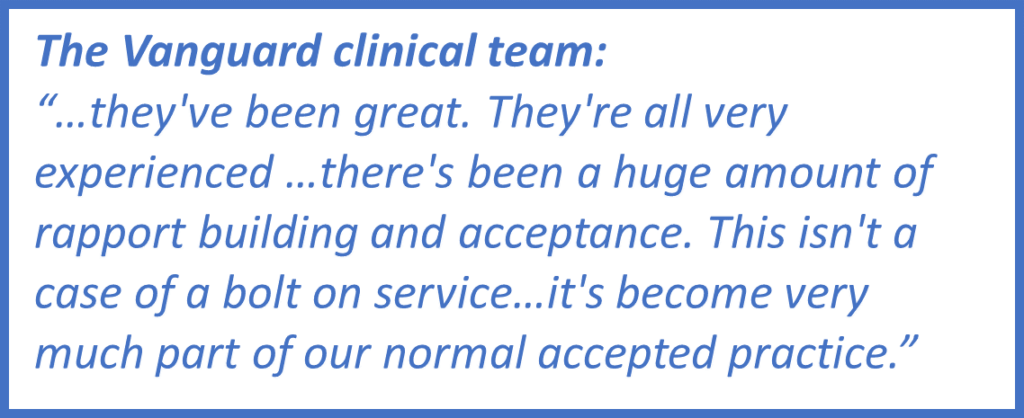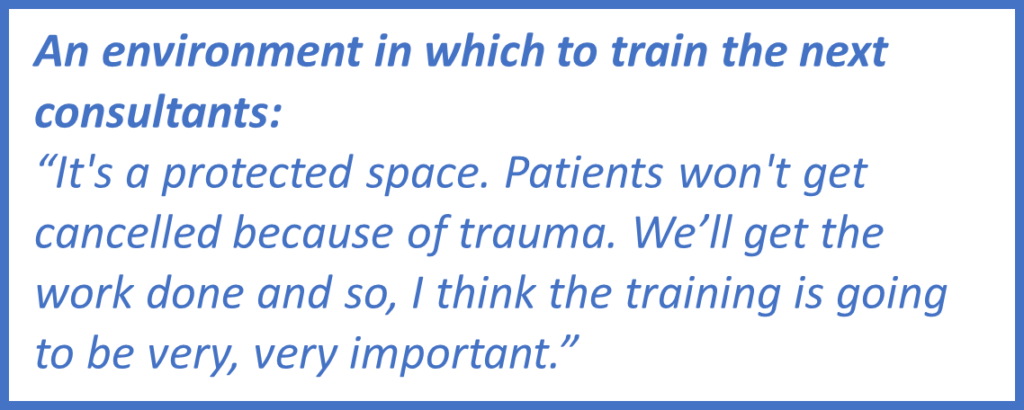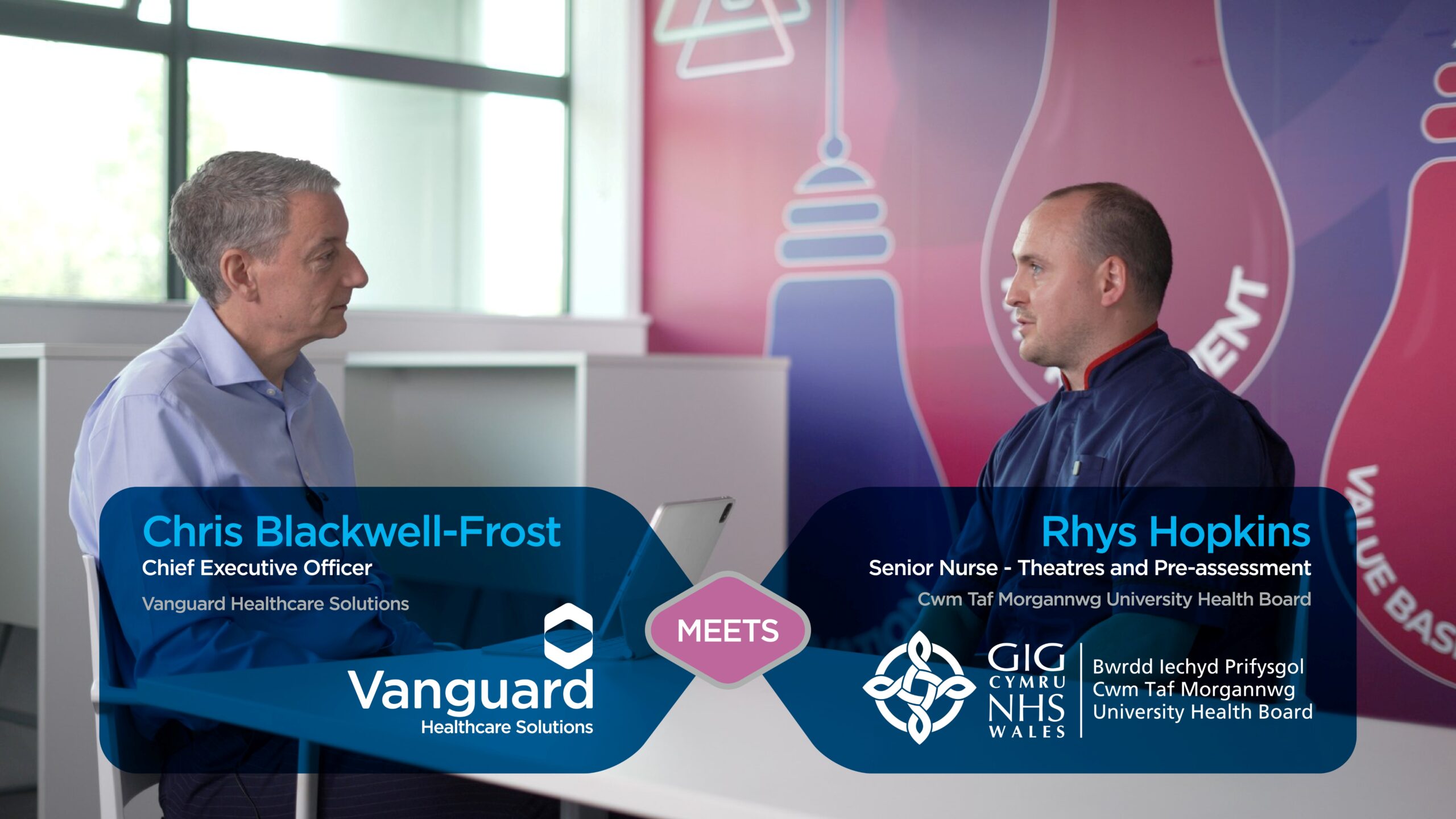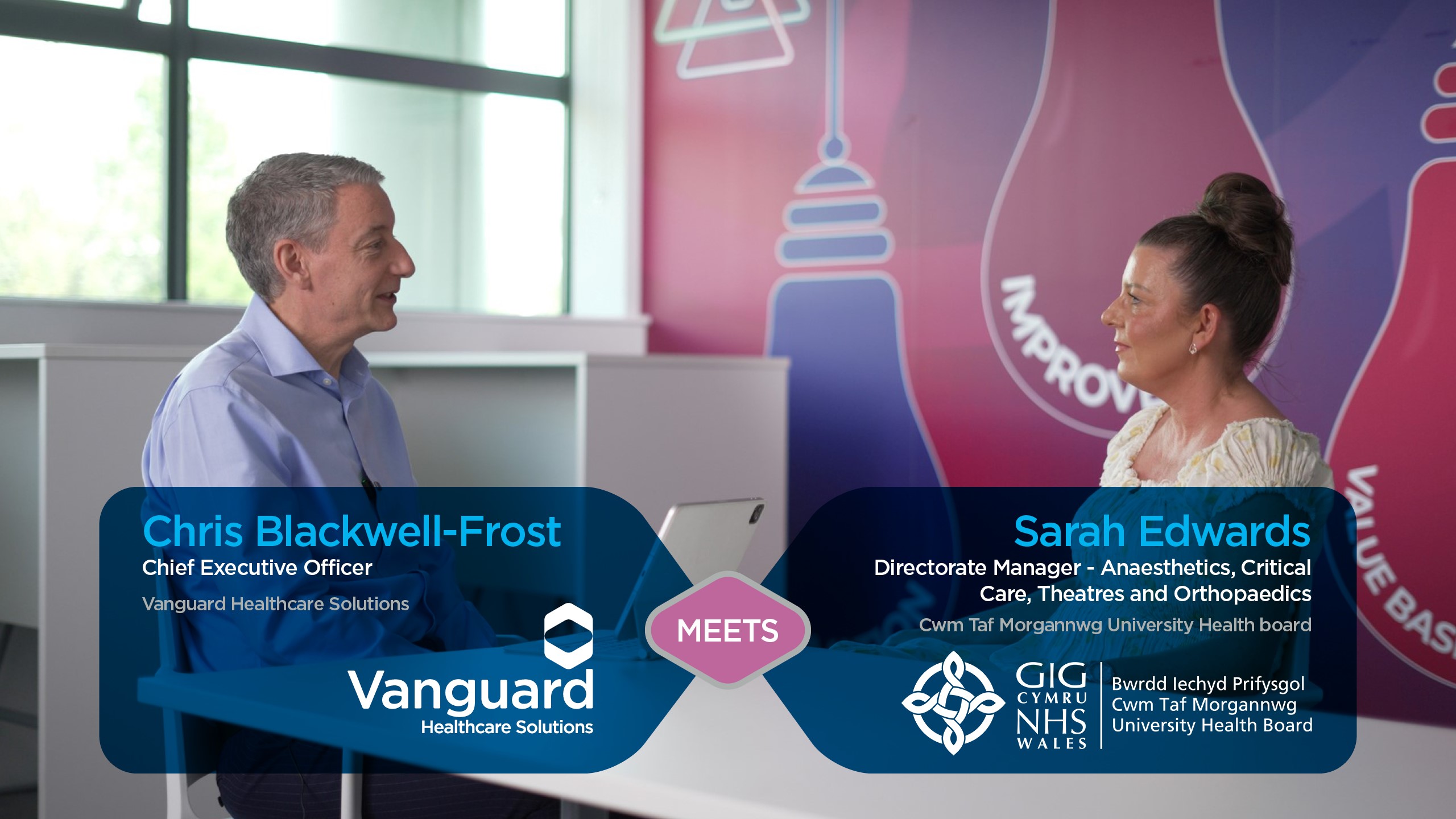It looks like you are in the United States
We have a different site (www.q-bital.com) which better suits your location
Tim and Chris met for this discussion at Warwick Hospital, about a month after South Warwickshire University NHS Foundation Trust began orthopaedic procedures in a Vanguard mobile laminar flow operating theatre. You can watch the meeting here or read the transcript, below.
For greater insight, there is a case study, here.
And for a different perspective of this project, you can watch a conversation Chris had with the Trust CEO and Operations Director, here.
Chris:
I understand that this is the fifth time you've worked in a Vanguard theatre. So, how do you find working in them?
Tim:
Basically, it's pretty easy. I think the most obvious difference is that they're smaller than a modern, full size operating theatre. Although, I think in my time, I've probably worked in some full-size operating theatres which have had less space. The big difference for Vanguard is that they've been thought through. So rather than trying to adapt to spaces as working practices have changed and laminar flow and what have you, you've got an environment where everything has already been thought through in terms of patient flows and the basic idea of having an anaesthetic room at one end and operating theatre in the middle and a recovery area at the other end works very well.

Chris:
It's always interesting when you talk to a consultant like yourself to understand the motivation behind getting additional theatre capacity on site. So, what was the reason for having the Vanguard Theatre on the Warwick site?
Tim:
So, I think for Warwick, we've always, always been in a very good position nationally and I think at the minute there's only about four trusts that are treating more patients within the 18-week RTT Pathway. I think we're about 71% at the minute. So, that's been a consistent feature of our activity and we've managed to achieve that.
We've done pretty well at keeping going through COVID, and I think we've managed to treat more than 100 patients through mutual aid from outside of our immediate catchment area, and that's all before we've even started with the Vanguard. So, I think we're starting with a very credible, strong position. Added to that, we've recently become an elective hub and I think we're probably one of fairly few elective hubs that are operating from an acute hospital site.

The Vanguard fits very well into that, in that we've got a group of willing surgeons, keen managers, keen ward staff, keen theatre staff who are already working hard. In order to take the next step and actually provide more mutual aid, which is what we're expecting to do, and to maintain our own RTT and basically fight our way out of out of the aftermath of COVID, you need a degree of ring fencing in a constructive way so that you can have a lot of elective flows of patients which aren't being interrupted with traumas and the day-to-day emergencies. Because we're an acute trust, that could be a pressure point for us.
Chris:
Does that bring its own challenges, then, having a surgical hub on a site that has trauma and has A&E? I presume that must bring its own challenges, as well as the benefits that you've just described.
Tim:
Yes, it brings its own challenges. The fact that we've been performing quite well for a number of years, I think, is because we've already got a handle on a lot of the potential disruption that can happen with emergency cases clearly needing to take priority over elective work but there are then new challenges. For example, we have now sited our Vanguard theatre separate to the rest of our operating theatres and so, we have to think through simple patient safety. We have to look at who are the appropriate patients to place in a Vanguard operating theatre and what you don't want to do is what I'm sure happens in a number of settings where you cherry pick all the easy patients and you have a great outcome through your Vanguard theatres but actually, the rest of your service suffers because now all of the difficult patients are being done elsewhere. So, it's a matter of managing it and we've got a great team that's doing that.
Chris:
And I guess it's all about that planning then, isn't it? In terms of getting greater efficiency by having a greater level of standardization through the theatre, I would imagine as well, rather than chopping and changing too much.

Tim:
Yeah. I think the first thing is that, in this particular instance, it's not been the situation for each of my five times working in a Vanguard, but in this instance, we are doing arthroplasty work, full stop, and we've got a group of committed surgeons who have agreed from the outset what kit they're going to be using because immediately you start opening a theatre in a different part of the building, you're going to need to increase your number of kits, your operating trays and all the other paraphernalia that goes with it. So, the first thing is to actually be very focused on what are the particular procedures that we're going to do and then to do them as a production line, in a positive way, a good production line that has got good quality control and so, I think that's a benefit of what we're doing. We've had our Vanguard open now for four weeks, and during that time we have done 81 joint replacements.
Chris:
And within that, you've got a team that will be working there on a consistent basis, just to get used to it, and I think you're working with a Vanguard team in there, as well, is that right?
Tim:
That's correct, yeah. It's been fantastic. We've got a team of five all together and they're all clinically qualified and are all able to undertake at least two of the three sort of standard roles in theatre in terms of anaesthetics, operating, circulating and recovery. And they've been great. They're all very experienced and one of the great things we've had is, because our theatre is now very close to our elective ward, there's been a huge amount of rapport building and acceptance. This isn't a case of a bolt on service which people are viewing from a distance, it's become very much part of our normal accepted practice.
Chris:
Excellent. And that actually becomes quite critical, I think, doesn't it? So it doesn't feel like you've got a theatre that is remote, like you say. Actually, it just becomes part of the way of doing things. And with the number of patients you are having through, you can clearly see the benefit that will come on the back of that.
Tim:
That's right. Yeah. We're aiming for four joint replacements a day. I think we've come to a conclusion that we could do five a day.
Chris:
And, the fact that you're also pulling from different hospital sites as well…how is that managed - the patient treatment list? Is that harder to do and how do you manage that patient flow?

Tim:
Yes, so, historically, we've had what we call our SWAT team, which is our South Yorkshire Accelerated Transfer team, who have been a team of nurses and physios, who've been able to take patients out from hospital earlier and when necessary, go and see them at home, phone them up and manage all of that. That works clearly very well when you've got people within a reasonable geographical area. When we have been treating patients from Wales as we've done recently, obviously the logistics are a little bit more complicated. If you have complications, generally we would like patients who have a problem after surgery to be getting in touch with us rather than their GP. I think that's good for us, it's good for the patient, it's pretty good for the GP as well. When they're much further afield that's not always quite so easy to manage. It's just something we need to look at in advance and because we've already been doing this mutual aid work, the Vanguard theatre in itself isn't a problem as far as that's concerned.
Chris:
I think in the past surgical hubs have been used as a training environment as well, in terms of the fact that you've got that steady throughput of patients. So, how have you found the Vanguard could help with the training environment side of things?
Tim:
I think it will do. In fact, in this particular Vanguard, for our first month, we've had a very clear policy that we're trying very much to do consultant driven surgery. I think it was a case of not trying to start doing too many things at once, but I'm a full time NHS consultant and I'm a surgical trainer, so I've got a training grade registrar with me and my expectation is that now we've ironed out some of the early simply issues around logistics and everything else, there will be time within that to do some training. And again, it's a kind of protected space. Patients won't get cancelled because of trauma. We’ll get the work done and so, I think the training is going to be very, very important.
Chris:
It's really interesting listening to you, thinking about probably the two key challenges facing the NHS at the moment. One is around dealing with the waiting lists and therefore the way that you describe the surgical hub with that consistent, efficient approach of driving through the waiting lists is very key. Then also, around having the training environment in order for you to train the next wave of consultants and obviously, clinicians as well, actually. So, it's really good to be able to play a role and play a part in that.



Vanguard Healthcare Solutions
Unit 1144 Regent Court, The Square, Gloucester Business Park, Gloucester, GL3 4AD

We have a different site (www.q-bital.com) which better suits your location